The latest edition of theScore’s Eras project, which celebrates greatness in every major sport over the last 25 years, ranks and discusses the 25 best male soccer players since 2000.
Remember: Respective accomplishments and accolades compiled before the year 2000 weren’t considered for this project. For example, Zinedine Zidane’s titanic showing in the 1998 World Cup isn’t part of his resume as it relates to this exercise, but his performances – and the infamous conclusion – in the 2006 tournament are taken into account.
Monday: Introductory essay and players 21-25
Tuesday: Players 16-20
Wednesday: Players 11-15
10. Neymar 🇧🇷
Era teams: Santos 2009-13; Barcelona 2013-17; PSG 2017-23; Al-Hilal 2023-present; Brazil 2010-present
Signature performance: Neymar inspired arguably the most astonishing comeback in Champions League history in 2017. “La Remontada” saw Barcelona score three goals in seven feverish minutes to close out a 6-1 win over Paris Saint-Germain and overturn the seemingly insurmountable 4-0 deficit from the first leg of their last-16 clash. Neymar was the chief architect.
The Brazilian went supernova with his team trailing 5-3 on aggregate in the waning minutes and needing three goals to advance. He curled home an inch-perfect free-kick in the 88th minute to awaken a resigned Camp Nou. He calmly slotted home a penalty three minutes later to fill the packed stadium with belief. Then, with the seconds ticking away, he faked Marco Verratti out of his boots and chipped a perfect ball over the defense for Sergi Roberto, who capped the preposterous Catalan comeback. On a team with Lionel Messi, it was Neymar who put Barca on his back in this moment of need.
Why he’s here: So much of Neymar’s career and legacy is viewed through a negative lens. The focus is often on what he didn’t achieve, the promise he never fulfilled, the milestones he failed to reach. Are certain elements of his career unsatisfying? Certainly.
He was signed from Santos in 2013 as the proverbial “next-best” player in the world. He should have been the heir to Messi at Barcelona. He could have led Brazil to a World Cup title. He had the chance to deliver PSG the Champions League triumph the club so desperately craves. He could still be playing in Europe instead of choosing the anonymity of the Saudi Pro League.
But that all misses the point. Instead, we should appreciate what Neymar was during his peak years (it’s possible there could yet be some magic left for Brazil, but at club level, he’s eschewed that chance by going to Saudi Arabia). At his best, when he was inspiring the “Remontada” or winning the Puskas Award as a teenager, Neymar was one of the greatest entertainers the sport’s ever seen. He’s the best pure dribbler in history, full stop, able to manipulate the ball and his body together in unique ways not seen before.
He’s the most expensive player ever, has more goals than Pele for Brazil, and dazzled for over a decade, hitting double figures in goal involvements every season he was in Europe. Don’t cry because it’s over, smile because it happened. – Gianluca Nesci
9. Zlatan Ibrahimovic 🇸🇪
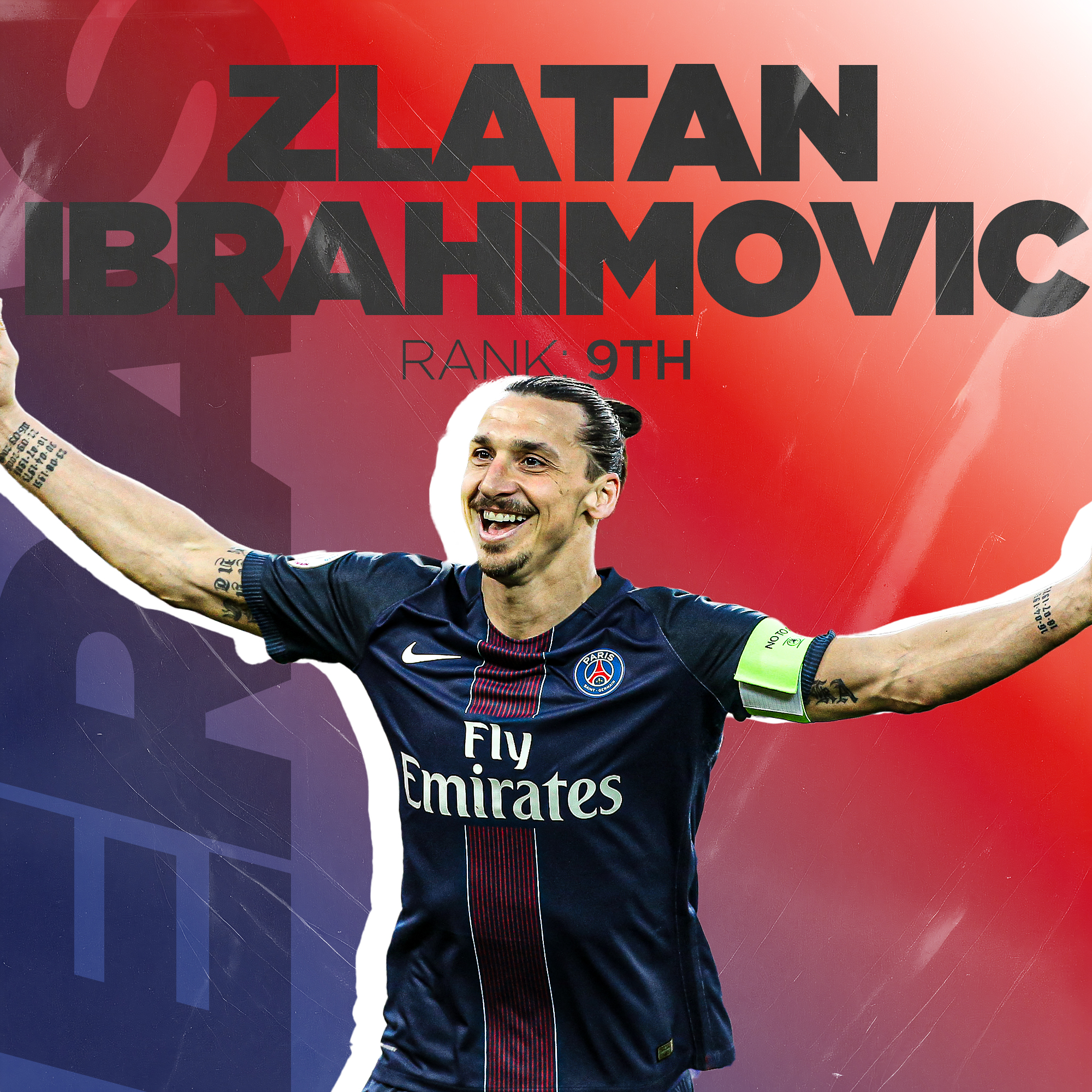
Era teams: Malmo 2000-01; Ajax 2001-04; Juventus 2004-06; Inter Milan 2006-09; Barcelona 2009-11; AC Milan 2010-12, 2020-23; PSG 2012-16; Manchester United 2016-18; LA Galaxy 2018-19; Sweden 2001-23
Signature performance: A teammate of Ibrahimovic described his performance against England in November 2012 as “Zlatan against children.” But it was more than that. He’d just scored four goals in that World Cup qualifier and made fools of his fiercest critics. Up until that point, he’d scored only three goals in 15 games against Premier League teams, making the English seem like his kryptonite. “The English media always attacked me,” Ibrahimovic recounted on “Hot Ones,” a YouTube series. “‘You think you’re good, but you’re not good. You’re just a prima donna with a ponytail. Blah, blah, blah.’ Then I scored that goal. You think I felt good? I felt very good. More than good. That was like putting it up their ass.”
Sweden was trailing 2-1 when Ibrahimovic powered home his second of the night to tie it. He completed the hat-trick with six minutes to go, finding the bottom corner with a low free-kick from around 30 yards out. Then came his piece de resistance: a spectacular 30-yard overhead kick that encapsulated the outrageous talent and ability of this once-in-a-generation striker.
Why he’s here: Ibrahimovic wasn’t simply a goal-scorer – he was an entertainer. He traveled from country to country like a circus act, showcasing his trademark mix of acrobatics and street smarts while winning title after title. He racked up 32 trophies in all – more than the majority of players on this list – across six different countries. His only trophy-less stint was with the LA Galaxy, and even then he did all he could, scoring 52 goals in 56 regular-season games, including a match-winning brace off the bench in his MLS debut.
Ibrahimovic ranks fourth in league goals scored with 302 since 2000. Only Messi, Cristiano Ronaldo, and Robert Lewandowski have done better. But none of them conquered four of the top five leagues as Ibrahimovic did. The breadth of his achievements is what truly sets him apart from his peers. He marked 25 consecutive calendar years with a goal, dating from the start of his senior career in 1999 to the end in 2023, and became the oldest scorer in Serie A history at 41 years and 166 days when he converted a penalty for AC Milan in one of his final appearances. The Swede’s career was built on success, singular moments, and longevity. Few players on this list managed to combine all three.
He would’ve been far higher on this list had he achieved anything worthwhile with Sweden. Though he scored six times for his country across four European Championships, Ibrahimovic failed to record a single World Cup goal. He couldn’t get his team to qualify on two occasions or past the quarterfinal stage of a major tournament. Ibrahimovic struggled to replicate his act on the international stage.
But his impact on the pitch was undeniable. He moved incredibly well for a big man, showing his quality as a playmaker and set-piece specialist, and consistently rose to the occasion, scoring in the Milan derby, El Clasico, the Manchester derby, and the later stages of the Champions League. He did it his way – and at the highest level. – Anthony Lopopolo
8. Karim Benzema 🇫🇷
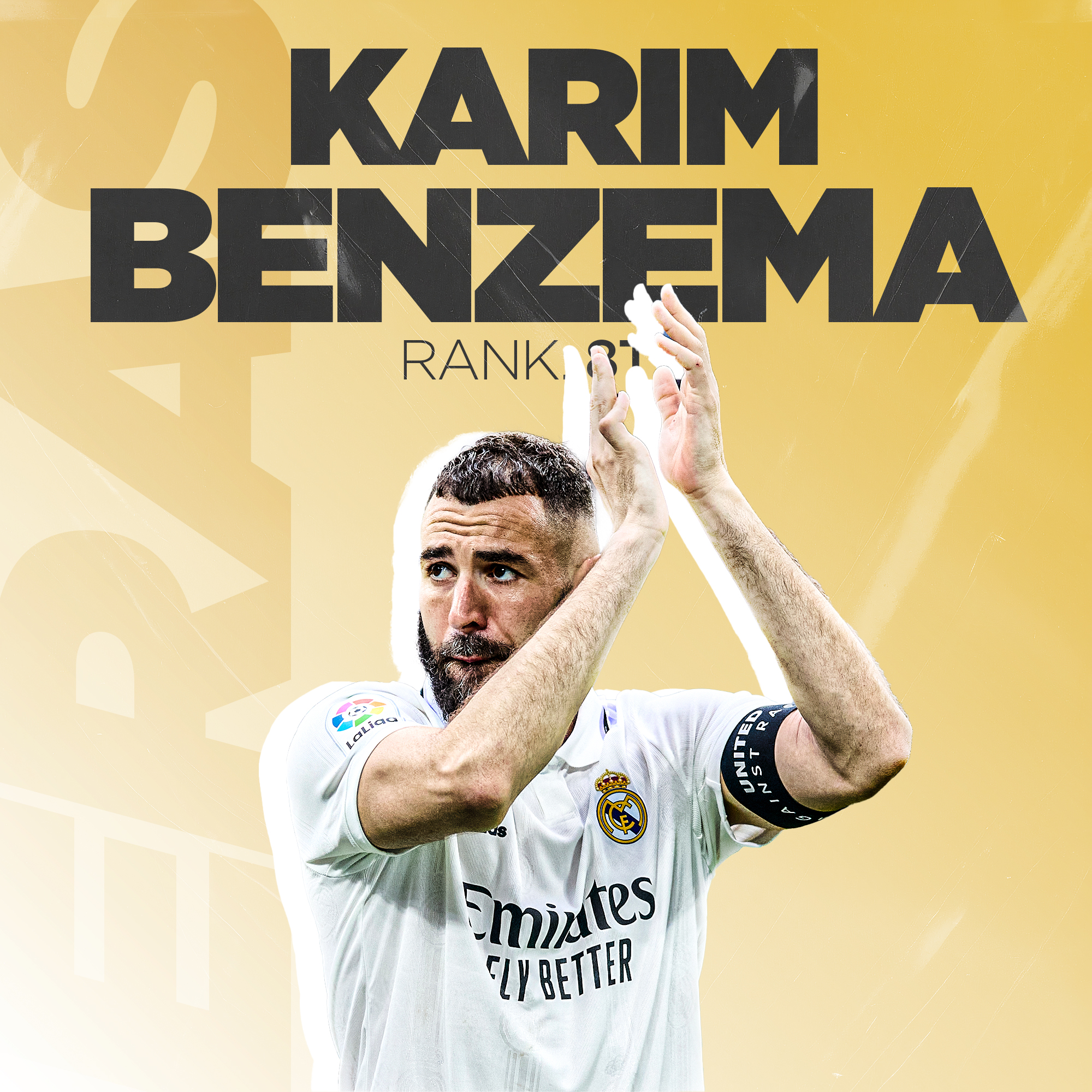
Era teams: Lyon 2004-09; Real Madrid 2009-23; Al-Ittihad 2023-present; France 2007-22
Signature performance: Benzema went on an all-time heater in the 2021-22 Champions League knockout stage. He scored a late hat-trick to eliminate PSG in the round of 16. He grabbed another treble in the first leg of the quarterfinals against Chelsea, then scored the decisive extra-time goal in the return fixture. He found the net three times over two wild matches against Manchester City in the semis, including – again – the critical tally in extra time that sent Real Madrid to yet another final. They went on to win the title, because, obviously.
The Frenchman finished the season with a tournament-leading 15 Champions League goals, 10 of which came in the knockout rounds – he took over when the stakes were highest. Only former teammate Cristiano Ronaldo, the man Benzema spent so long in deference to on the pitch, has ever scored more in a single Champions League campaign.
Why he’s here: It feels odd to say this about a literal Ballon d’Or winner, but Benzema is among the most underrated superstars of his generation, even with his incredible collection of accolades. Playing primarily in service to Ronaldo for nine years will have that effect. Benzema was the perfect facilitator, freeing up his illustrious teammate to rack up records. Would Ronaldo still have scored an obscene number of goals at Real Madrid without his longtime running mate? Absolutely. Would he have scored as many? Perhaps not. Benzema made the task easier.
The French forward took center stage in the Spanish capital when Ronaldo, and his shadow, departed for Juventus in 2018. And how.
In his final five years at the club, starting in his age-30 season, Benzema scored 111 goals in La Liga alone. At the point where most players start slowing down, he went into high gear, somehow getting better as he got older. The aforementioned Champions League run was the zenith.
He’s been part of two dynastic squads during the era in question, breaking through as a teenager amid Lyon’s run of seven consecutive Ligue 1 titles after the turn of the century, and then, of course, the Madrid side that hoarded Champions League trophies over the last decade. He’s the fourth-highest scorer in Champions League history, and sits second on Real Madrid’s all-time list, ahead of club icons like Raul and Alfredo Di Stefano. Not bad for a sidekick. – Nesci
7. Kevin De Bruyne 🇧🇪
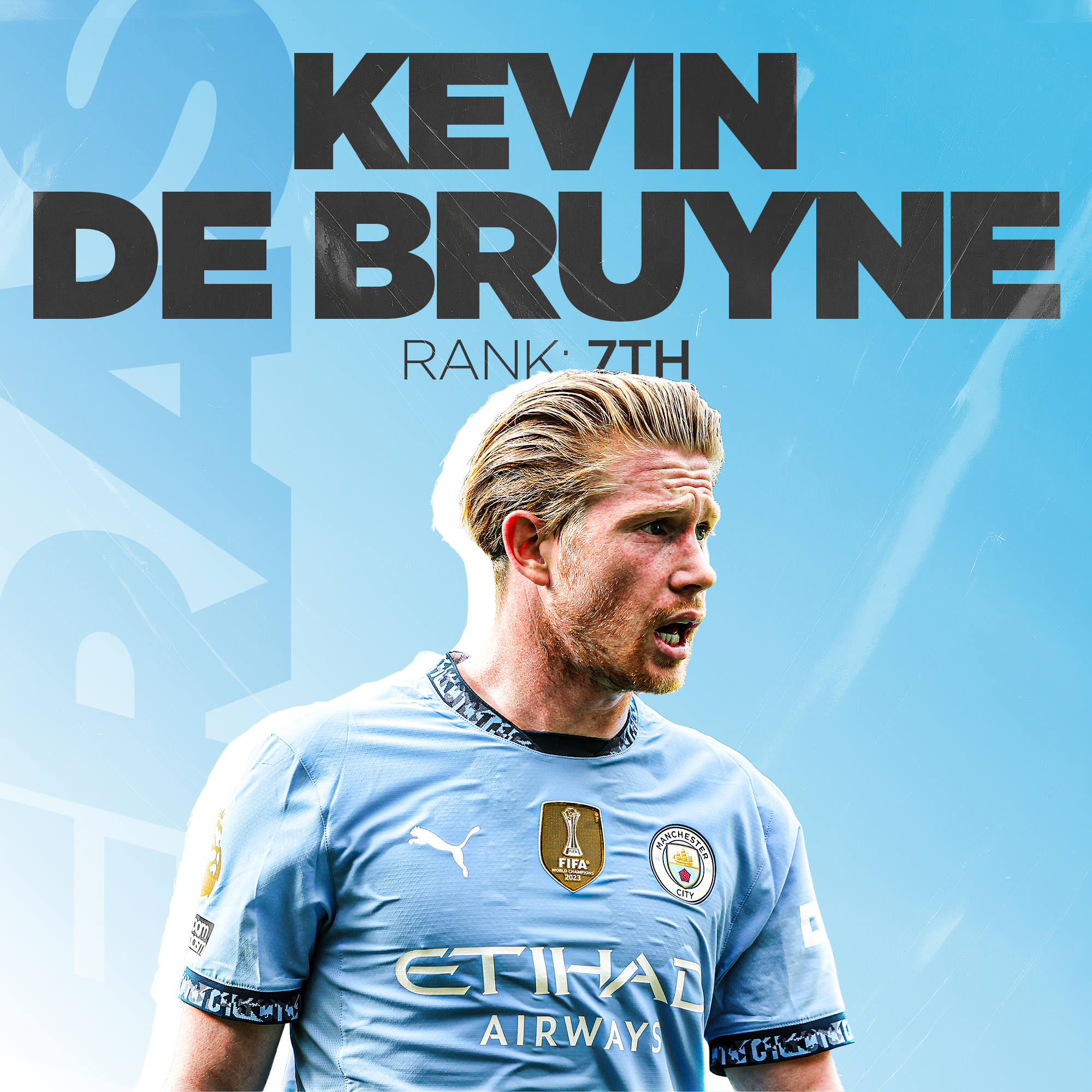
Era teams: Genk 2008-12; Chelsea 2012-13; Werder Bremen 2012-13; VfL Wolfsburg 2014-15; Manchester City 2015-present; Belgium 2010-present
Signature performance: It took an almost perfect performance from Kevin De Bruyne in late May of the 2021-22 season to tee up Manchester City’s successful Premier League title defense. With Liverpool trailing closely in the race amid an unbeaten run that began in January 2022, securing at least an away point against a tricky Wolverhampton side was imperative in keeping City on track to win back-to-back titles.
Any nerves heading into the game were extinguished after De Bruyne’s tone-setting goal seven minutes in. The Premier League’s most creative midfielder had morphed into a lethal scorer, recording a first-half hat-trick on his way to netting four goals in a 5-1 win that helped City soften the sting of being knocked out of the Champions League a week earlier. It wasn’t long before City were celebrating again, winning dramatically on the final day to finish ahead of Liverpool by a point in one of the tightest titles races in Premier League history.
Why he’s here: One of the big “what ifs?” in the sport involves De Bruyne. There’s no telling how different the Premier League landscape could’ve been had Chelsea been willing to wait for the young Belgian to blossom into one of the most consistently great players of his generation. A little patience could’ve wildly altered the course the Premier League’s taken this past decade.
De Bruyne instead was shipped off to Germany, where he grew into a star after being sold for a measly £18 million. His impressive season at Wolfsburg translated into City making the organization-altering decision to bring De Bruyne to the Etihad Stadium. He’s more than flourished in his return to the Premier League, lifting the league title six times and winning the PFA Players’ Player of the Year twice (2020 and 2021).
City might’ve been OK without him, likely spending their money on other players to help deliver titles. But their ascendance wouldn’t have been so rapid without De Bruyne. Simply put, he makes everyone around him better. His vision is astounding, while his ability to create opportunities from nothing and intense will to succeed helped City achieve their quest for world domination. – Gordon Brunt
6. Xavi 🇪🇸
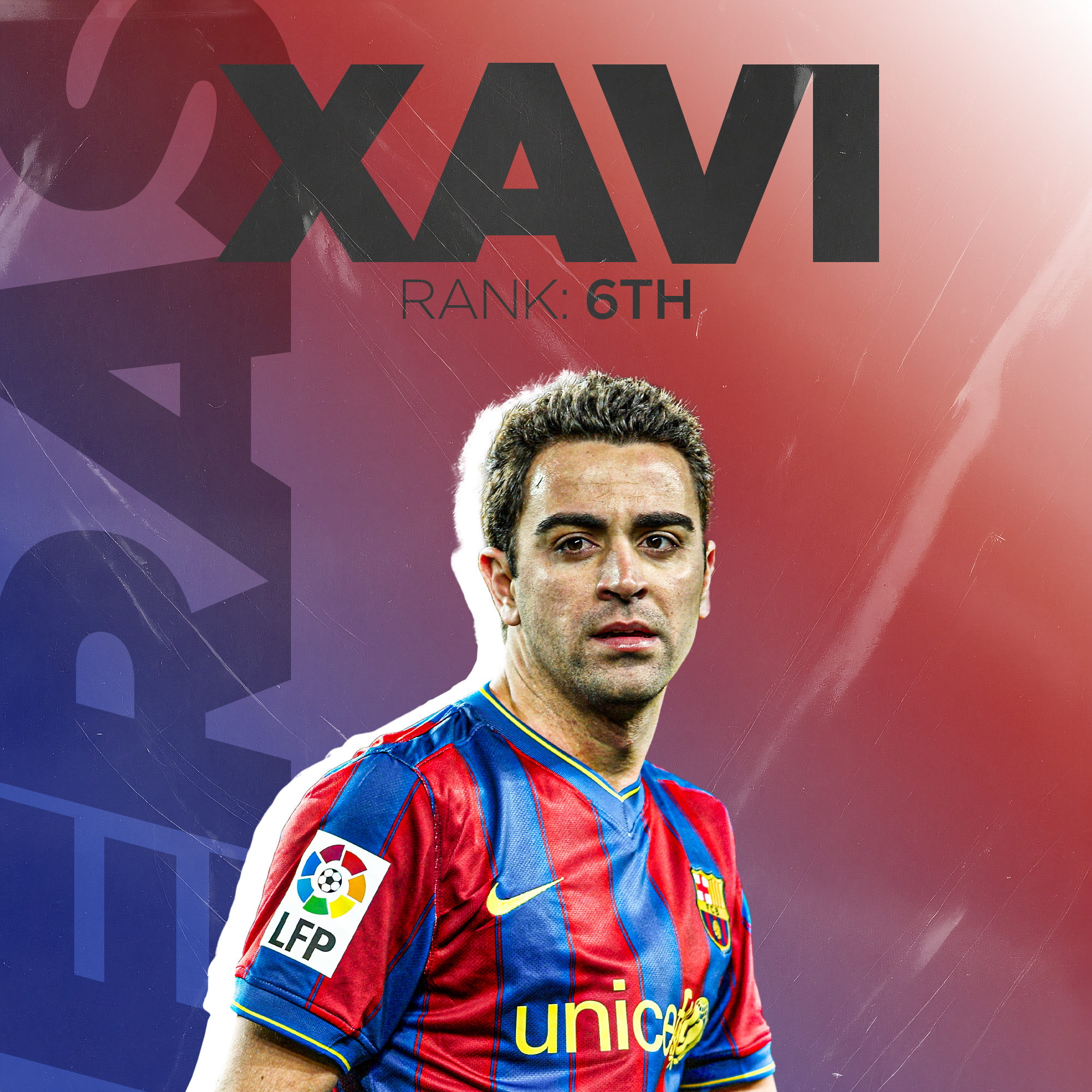
Era teams: Barcelona 2000-15; Al-Sadd 2015-19; Spain 2000-14
Signature performance: The 2010-11 Barcelona team might be one of the most revered in soccer history. While Messi deserves a lot of credit after scoring more than 50 goals in all competitions, the level of success he and Barca had that season probably doesn’t happen without Xavi pulling the strings. There’s no shortage of examples to prove this, but look no further than the Champions League final win over Manchester United.
Xavi’s reputation preceded him on the first goal. United defenders didn’t want to take any risks, giving Xavi acres of space before the Spanish magician pulled the trigger on a perfectly timed pass to Pedro in the box for the opening goal. He made an excellent United team look ordinary, orchestrating a masterclass performance that had Wayne Rooney, according to Xavi, begging for mercy.
Why he’s here: Before Xavi (BX). That’s how the Spanish national team’s era of disappointment should be classified in the years preceding Xavi’s emergence as a bona fide star. La Roja suddenly went from a perennial underachiever that regularly bowed out of tournaments to an unstoppable, well-rounded unit that was the envy of the world by the time Xavi led Spain to Euro 2008. For fans who didn’t watch La Liga, Euro 2008 was a chance to see how one of the game’s brightest stars had transformed Spain.
Xavi rarely disappointed on the big stage, and Euro 2008 was no different: he was named player of the tournament after guiding Spain to its first major trophy in 44 years. It was the beginning of a chapter in international soccer few will forget, as Xavi played a crucial role during the most successful period in Spain’s history. Further triumphs at the 2010 World Cup and Euro 2012 only cemented his legendary status. Trophies were also piling up at Barca, where he was part of multiple La Liga and Champions League-winning teams.
The face of tiki-taka, Xavi was key in revolutionizing the game with a style of play that put an emphasis on precise, short passes, and which highlighted his otherworldly ability to operate efficiently within limited space. Xavi was always a step ahead, possessing an unmatched ability to interpret the game. Making the right pass was second nature to him, a benefit of being able to read the game at a level beyond his opponents’ comprehension. – Brunt
Our series wraps Friday with the top five.










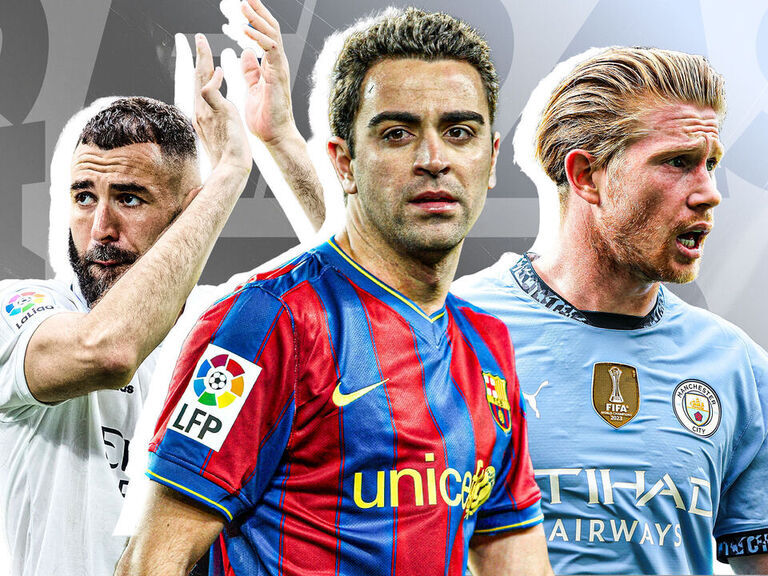
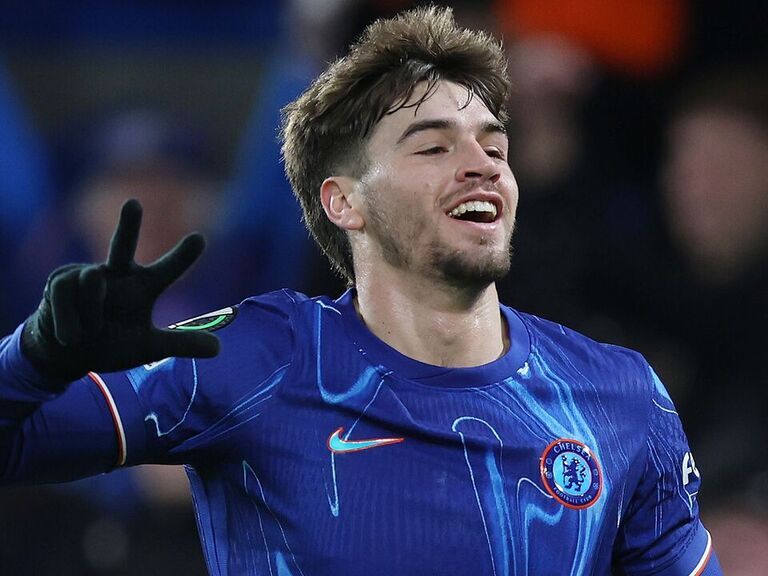






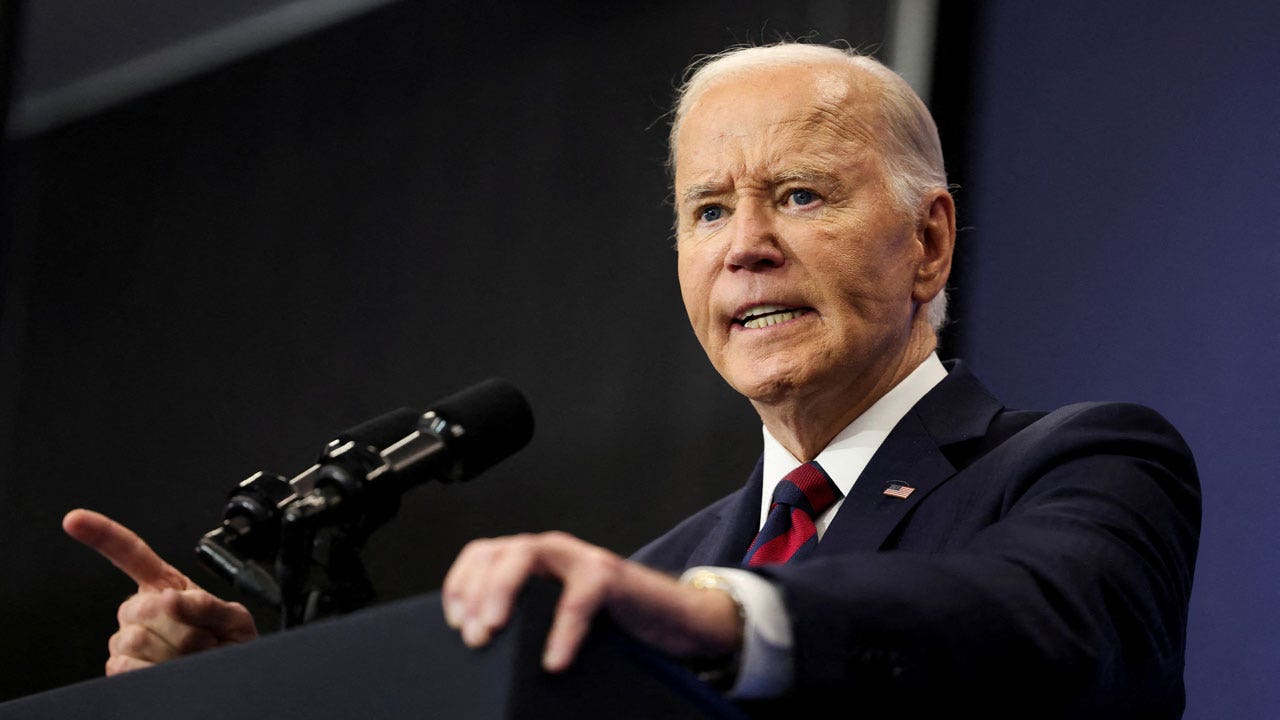


Discussion about this post